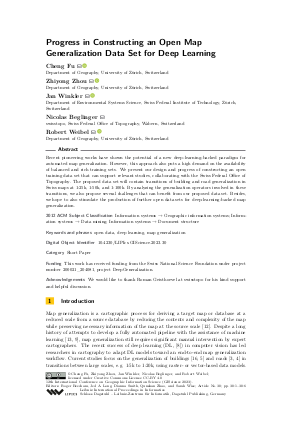Progress in Constructing an Open Map Generalization Data Set for Deep Learning (Short Paper)
Authors
Cheng Fu  ,
Zhiyong Zhou
,
Zhiyong Zhou  ,
Jan Winkler
,
Jan Winkler  ,
Nicolas Beglinger,
Robert Weibel
,
Nicolas Beglinger,
Robert Weibel 
-
Part of:
Volume:
12th International Conference on Geographic Information Science (GIScience 2023)
Part of: Series: Leibniz International Proceedings in Informatics (LIPIcs)
Part of: Conference: International Conference on Geographic Information Science (GIScience) - License:
 Creative Commons Attribution 4.0 International license
Creative Commons Attribution 4.0 International license
- Publication Date: 2023-09-07
File

PDF
LIPIcs.GIScience.2023.30.pdf
- Filesize: 1.86 MB
- 6 pages
Document Identifiers
Subject Classification
ACM Subject Classification
- Information systems → Geographic information systems
- Information systems → Data mining
- Information systems → Document structure
Keywords
- open data
- deep learning
- map generalization
Metrics
- Access Statistics
-
Total Accesses (updated on a weekly basis)
0Document
0Metadata
Abstract
Recent pioneering works have shown the potential of a new deep-learning-backed paradigm for automated map generalization. However, this approach also puts a high demand on the availability of balanced and rich training sets. We present our design and progress of constructing an open training data set that can support relevant studies, collaborating with the Swiss Federal Office of Topography. The proposed data set will contain transitions of building and road generalization in Swiss maps at 1:25k, 1:50k, and 1:100k. By analyzing the generalization operators involved in these transitions, we also propose several challenges that can benefit from our proposed data set. Besides, we hope to also stimulate the production of further open data sets for deep-learning-backed map generalization.
Cite As Get BibTex
Cheng Fu, Zhiyong Zhou, Jan Winkler, Nicolas Beglinger, and Robert Weibel. Progress in Constructing an Open Map Generalization Data Set for Deep Learning (Short Paper). In 12th International Conference on Geographic Information Science (GIScience 2023). Leibniz International Proceedings in Informatics (LIPIcs), Volume 277, pp. 30:1-30:6, Schloss Dagstuhl – Leibniz-Zentrum für Informatik (2023)
https://doi.org/10.4230/LIPIcs.GIScience.2023.30
BibTex
@InProceedings{fu_et_al:LIPIcs.GIScience.2023.30,
author = {Fu, Cheng and Zhou, Zhiyong and Winkler, Jan and Beglinger, Nicolas and Weibel, Robert},
title = {{Progress in Constructing an Open Map Generalization Data Set for Deep Learning}},
booktitle = {12th International Conference on Geographic Information Science (GIScience 2023)},
pages = {30:1--30:6},
series = {Leibniz International Proceedings in Informatics (LIPIcs)},
ISBN = {978-3-95977-288-4},
ISSN = {1868-8969},
year = {2023},
volume = {277},
editor = {Beecham, Roger and Long, Jed A. and Smith, Dianna and Zhao, Qunshan and Wise, Sarah},
publisher = {Schloss Dagstuhl -- Leibniz-Zentrum f{\"u}r Informatik},
address = {Dagstuhl, Germany},
URL = {https://drops.dagstuhl.de/entities/document/10.4230/LIPIcs.GIScience.2023.30},
URN = {urn:nbn:de:0030-drops-189257},
doi = {10.4230/LIPIcs.GIScience.2023.30},
annote = {Keywords: open data, deep learning, map generalization}
}
Author Details
- Department of Environmental Systems Science, Swiss Federal Institute of Technology, Zürich, Switzerland
Funding
This work has received funding from the Swiss National Science Foundation under project number 200021_204081, project DeepGeneralization.
Acknowledgements
We would like to thank Roman Geisthoevel at swisstopo for his kind support and helpful discussion.
References
-
Chirag Agarwal, Owen Queen, Himabindu Lakkaraju, and Marinka Zitnik. Evaluating explainability for graph neural networks. Scientific Data, 10(144), 2023.

-
Thomas Brinkhoff, Hans-Peter Kriegel, Ralf Schneider, and Alexander Braun. Measuring the complexity of polygonal objects. In ACM-GIS, volume 109, 1995.

-
Azelle Courtial, Guillaume Touya, and Xiang Zhang. Constraint-based evaluation of map images generalized by deep learning. Journal of Geovisualization and Spatial Analysis, 6(1):13, 2022.

-
Azelle Courtial, Guillaume Touya, and Xiang Zhang. Deriving map images of generalised mountain roads with generative adversarial networks. International Journal of Geographical Information Science, 37(3):499-528, 2023.

-
Yu Feng, Frank Thiemann, and Monika Sester. Learning cartographic building generalization with deep convolutional neural networks. ISPRS International Journal of Geo-Information, 8(6):258, 2019.

-
David Gunning, Mark Stefik, Jaesik Choi, Timothy Miller, Simone Stumpf, and Guang-Zhong Yang. Xai—explainable artificial intelligence. Science robotics, 4(37):eaay7120, 2019.

-
Jia Deng, Wei Dong, Richard Socher, Li-Jia Li, Kai Li, and Li Fei-Fei. ImageNet: A large-scale hierarchical image database. In 2009 IEEE Conference on Computer Vision and Pattern Recognition, pages 248-255. IEEE, June 2009.

-
Yann LeCun, Yoshua Bengio, and Geoffrey Hinton. Deep learning. nature, 521(7553):436-444, 2015.

-
Corinne Plazanet, Nara Martini Bigolin, and Anne Ruas. Experiments with learning techniques for spatial model enrichment and line generalization. GeoInformatica, 2:315-333, 1998.

-
L Tiina Sarjakoski. Conceptual models of generalisation and multiple representation. Generalisation of Geographic Information, pages 11-35, 2007.

-
Ramprasaath R Selvaraju, Michael Cogswell, Abhishek Das, Ramakrishna Vedantam, Devi Parikh, and Dhruv Batra. Grad-cam: Visual explanations from deep networks via gradient-based localization. In Proceedings of the IEEE international conference on computer vision, pages 618-626, 2017.

-
Robert Weibel and Geoffrey Dutton. Generalising spatial data and dealing with multiple representations. In P.A. Longley, M.F. Goodchild, D.J. Maguire, and D. Rhind, editors, Geographical Information Systems: Principles and Applications, volume 1, pages 125-155. Longman Scientific & Technical, London, 1999.

-
Robert Weibel, Stefan Keller, and Tumasch Reichenbacher. Overcoming the knowledge acquisition bottleneck in map generalization: The role of interactive systems and computational intelligence. In Andrew U. Frank and Werner Kuhn, editors, Spatial Information Theory A Theoretical Basis for GIS, volume 988, pages 139-156, Berlin, Heidelberg, 1995. Springer Berlin Heidelberg.

-
Tianyuan Xiao, Tinghua Ai, Huafei Yu, Min Yang, and Pengcheng Liu. A point selection method in map generalization using graph convolutional network model. Cartography and Geographic Information Science, pages 1-21, 2023.

-
Xiongfeng Yan, Tinghua Ai, Min Yang, and Hongmei Yin. A graph convolutional neural network for classification of building patterns using spatial vector data. ISPRS Journal of Photogrammetry and Remote Sensing, 150:259-273, 2019.

-
Zhiyong Zhou, Cheng Fu, and Robert Weibel. Move and remove: Multi-task learning for building simplification in vector maps with a graph convolutional neural network. ISPRS Journal of Photogrammetry and Remote Sensing, 202:205-218, 2023.

